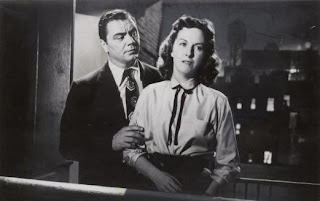 |
| To distract from any Oedipus complex jokes? |
Marty is, not surprisingly, the story of Marty (Ernest Borgnine), an Italian-American New York butcher. Marty's a genuinely nice guy that has a good job, is good to his mother (Esther Minciotti), and is relied on by his family. His problem is that he has Ernest Borgnine's face.
 |
| Quelle horror! |
His looks and naturally shy personality have combined to leave Marty a bachelor at the ripe old age of 34. As all the older women in his neighborhood frequently tell him, "[he] should be ashamed" of still being single, especially since his younger brothers are now all married with children. His biological clock is ticking, you know. It's not that Marty wants to be single, he just can't seem to attract any women. All he does is work, do nice things for his mother, and hang out at a diner with his equally dull best friend, Angie (Joe Mantell).
 |
| If it was possible to cohabitate in a booth, these two would be common-law husbands |
Admittedly, Marty is a pretty simple story. Despite that, Paddy Chayefsky's script is surprisingly well-done. It's not hilarious, but it has some clever moments.
 |
| Example: Who farted? |
Mann's direction helped shape Marty into a treat for acting fans. Ernest Borgnine is absolutely wonderful in the title role. It's fairly unusual to see such a varied and vulnerable performance in a Hollywood movie (especially one made in 1955), but Borgnine manages to be gruff, vulnerable, sad, optimistic, and absolutely adorable within the same role. I've seen maybe six or seven Borgnine roles over the years but I never dreamed he could be this good. Betsy Blair was also very good as the plain Clara. I preferred her shy moments over her tears, but she wasn't at all annoying, despite her mopiness.
Marty is about 80% Borgnine, 10% Blair and 10% everybody else, but even everybody else was pretty entertaining. Esther Manciotti was essentially a stereotype, but successfully added believable motivations and insecurities to the mix. Augusta Ciolli, in a similar role, wasn't as good, but still gave a deeper performance than I expected. Joe Mantell's part was fairly simple, but he did a good job conveying the undercurrent of jealousy that the script never makes explicit in his character. Jerry Paris and Karen Steel are the only other noteworthy actors in Marty, but theirs are easily the worst performances. To be fair, though, they had the least screen time and the least to work with.
Marty is a very low-key movie, but it is thoroughly enjoyable, from start to finish. The characters are easy to identify with, the emotions seem sincere, and the script --- despite its age --- is still cute. Hearing Marty's mom reference a place with lots of girls as "loaded with tomatoes" is the most adorable thing I have heard from someone over the age of three. You can make some justifiable complaints about Marty, though. Many of the background characters are complete Italian stereotypes, most characters make their point over and over and over again, and the ending can seem abrupt if you lose sight of the core concept. None of that truly matters, though. This is a quiet, uplifting story that warms the heart more than most epic romances. So, if you're like me and are confused by the fact the Ernest Borgnine won a Best Actor Oscar, or that Marty is one of only two movies in history to win the Cannes Palme d'Or and the Best Picture Oscar --- yes, it's that good.


No comments:
Post a Comment